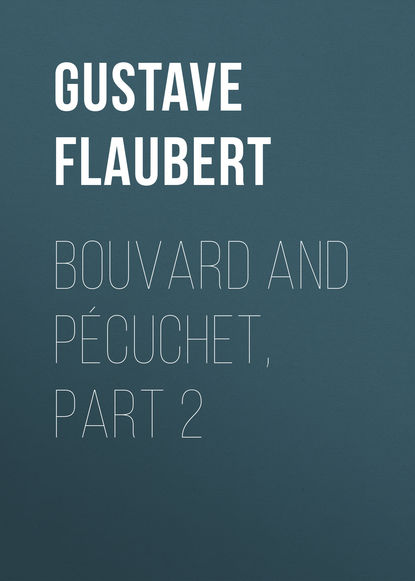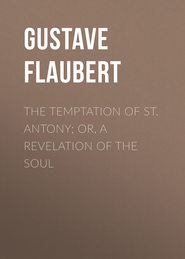По всем вопросам обращайтесь на: info@litportal.ru
(©) 2003-2024.
✖
Bouvard and Pécuchet, part 2
Настройки чтения
Размер шрифта
Высота строк
Поля
“Why do you groan during mealtime?”
“We ought to eat with groans,” returned Pécuchet, “for it was in that way that man lost his innocence” – a phrase which he had read in the Seminarist’s Manual, two duodecimo volumes he had borrowed from M. Jeufroy: and he drank some of the water of La Salette, gave himself up with closed doors to ejaculatory prayers, and aspired to join the confraternity of St. Francis.
In order to obtain the gift of perseverance, he resolved to make a pilgrimage in honour of the Blessed Virgin. He was perplexed as to the choice of a locality. Should it be Nôtre Dame de Fourviers, de Chartres, d’Embrun, de Marseille, or d’Auray? Nôtre Dame de la Délivrande was nearer, and it suited just as well.
“You will accompany me?”
“I should look like a greenhorn,” said Bouvard.
After all, he might come back a believer; he did not object to being one; and so he yielded through complaisance.
Pilgrimages ought to be made on foot. But forty-three kilometers would be trying; and the public conveyances not being adapted for meditation, they hired an old cabriolet, which, after a twelve hours’ journey, set them down before the inn.
They got an apartment with two beds and two chests of drawers, supporting two water-jugs in little oval basins; and “mine host” informed them that this was “the chamber of the Capuchins” under the Terror. There La Dame de la Délivrande had been concealed with so much precaution that the good fathers said mass there clandestinely.
This gave Pécuchet pleasure, and he read aloud a sketch of the history of the chapel, which had been taken downstairs into the kitchen.
It had been founded in the beginning of the second century by St. Régnobert, first bishop of Lisieux, or by St. Ragnebert, who lived in the seventh, or by Robert the Magnificent in the middle of the eleventh.
The Danes, the Normans, and, above all, the Protestants, had burnt and ravaged it at various epochs. About 1112, the original statue was discovered by a sheep, which indicated the place where it was by tapping with its foot in a field of grass; and on this spot Count Baudouin erected a sanctuary.
“ ‘Her miracles are innumerable. A merchant of Bayeux, taken captive by the Saracens, invoked her: his fetters fell off, and he escaped. A miser found a nest of rats in his corn loft, appealed to her aid, and the rats went away. The touch of a medal, which had been rubbed over her effigy, caused an old materialist from Versailles to repent on his death-bed. She gave back speech to Sieur Adeline, who lost it for having blasphemed; and by her protection, M. and Madame de Becqueville had sufficient strength to live chastely in the married state.
“ ‘Amongst those whom she cured of irremediable diseases are mentioned Mademoiselle de Palfresne, Anne Lirieux, Marie Duchemin, François Dufai, and Madame de Jumillac née d’Osseville.
“ ‘Persons of high rank have visited her: Louis XI., Louis XIII., two daughters of Gaston of Orléans, Cardinal Wiseman, Samirrhi, patriarch of Antioch, Monseigneur Véroles, vicar apostolic of Manchuria; and the Archbishop of Quelen came to return thanks to her for the conversion of Prince Talleyrand.’ ”
“She might,” said Pécuchet, “convert you also!”
Bouvard, already in bed, gave vent to a species of grunt, and presently was fast asleep.
Next morning at six o’clock they entered the chapel.
Another was in course of construction. Canvas and boards blocked up the nave; and the monument, in a rococo style, displeased Bouvard, above all, the altar of red marble with its Corinthian pilasters.
The miraculous statue, in a niche at the left of the choir, was enveloped in a spangled robe. The beadle came up with a wax taper for each of them. He fixed it in a kind of candlestick overlooking the balustrade, asked for three francs, made a bow, and disappeared.
Then they surveyed the votive offerings. Inscriptions on slabs bore testimony to the gratitude of the faithful. They admired two swords in the form of a cross presented by a pupil of the Polytechnic School, brides’ bouquets, military medals, silver hearts, and in the corner, along the floor, a forest of crutches.
A priest passed out of the sacristy carrying the holy pyx.
When he had remained for a few minutes at the bottom of the altar, he ascended the three steps, said the Oremus, the Introit, and the Kyrie, which the boy who served mass recited all in one breath on bended knees.
The number present was small – a dozen or fifteen old women. The rattling of their beads could be heard accompanying the noise of a hammer driving in stones. Pécuchet bent over his prie-dieu and responded to the “Amens.” During the elevation, he implored Our Lady to send him a constant and indestructible faith. Bouvard, in a chair beside him, took up his Euchology, and stopped at the litany of the Blessed Virgin.
“Most pure, most chaste, most venerable, most amiable, most powerful – Tower of ivory – House of gold – Gate of the morning.”
These words of adoration, these hyperboles drew him towards the being who has been the object of so much reverence. He dreamed of her as she is represented in church paintings, above a mass of clouds, cherubims at her feet, the Infant Jesus on her breast – Mother of tendernesses, upon whom all the sorrows of the earth have a claim – ideal of woman carried up to heaven; for man exalts that love arising out of the depths of the soul, and his highest aspiration is to rest upon her heart.
The mass was finished. They passed along by the dealers’ sheds which lined the walls in front of the church. They saw there images, holy-water basins, urns with fillets of gold, Jesus Christs made of cocoanuts, and ivory chaplets; and the sun brought into prominence the rudeness of the paintings, the hideousness of the drawings. Bouvard, who had some abominable specimens at his own residence, was indulgent towards these. He bought a little Virgin of blue paste. Pécuchet contented himself with a rosary as a memento.
The dealers called out: “Come on! come on! For five francs, for three francs, for sixty centimes, for two sous, don’t refuse Our Lady!”
The two pilgrims sauntered about without making any selections from the proffered wares. Uncomplimentary remarks were made about them.
“What is it they want, these creatures?”
“Perhaps they are Turks.”
“Protestants, rather.”
A big girl dragged Pécuchet by the frock-coat; an old man in spectacles placed a hand on his shoulder; all were bawling at the same time; and a number of them left their sheds, and, surrounding the pair, redoubled their solicitations and effronteries.
Bouvard could not stand this any longer.
“Let us alone, for God’s sake!”
The crowd dispersed. But one fat woman followed them for some distance, and exclaimed that they would repent of it.
When they got back to the inn they found Gouttman in the café. His business called him to these quarters, and he was talking to a man who was examining accounts at a table.
This person had a leather cap, a very wide pair of trousers, a red complexion, and a good figure in spite of his white hair: he had the appearance at the same time of a retired officer and an old strolling player.
From time to time he rapped out an oath; then, when Gouttman replied in a mild tone, he calmed down at once and passed to another part of the accounts.
Bouvard who had been closely watching him, at the end of a quarter of an hour came up to his side.
“Barberou, I believe?”
“Bouvard!” exclaimed the man in the cap, and they embraced each other.
Barberou had in the course of twenty years experienced many changes of fortune. He had been editor of a newspaper, an insurance agent, and manager of an oyster-bed.
“I will tell you all about it,” he said.
At last, having returned to his original calling, he was travelling for a Bordeaux house, and Gouttman, who took care of the diocese, disposed of wines for him to the ecclesiastics. “But,” he hurriedly added, “you must pardon me one minute; then I shall be at your service.”
He was proceeding with the examination of the accounts, and all of a sudden he jumped up excitedly.
“What! two thousand?”
“Certainly.”
“Ha! it’s wrong, that’s what it is!”
“What do you say?”
“I say that I’ve seen Hérambert myself,” replied Barberou in a passion. “The invoice makes it four thousand. No humbug!”

















